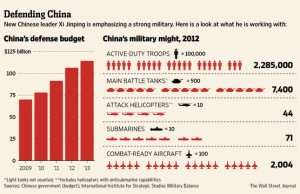 After coming into power, Xi Jinping, Communist Party and military chief and soon to be President of China, began a series of speeches emphasizing the “China Dream,” or more specifically, the ascension of the nation as a great power through military prowess. Unlike his predecessors, within his first 100 days, Mr. Xi has already made visits to the army, air force, space program, and missile command. It is clear that under its new leadership, China is ready to exchange its traditionally defensive military efforts for a more active presence that is able to “fight and win wars.” The recent territorial dispute with Japan demonstrates that Mr. Xi is very serious about his new direction. Mr. Xi’s ultimate goal is to build the nation up as the dominant Pacific power by 2049, the 100th anniversary of the Communist Party’s rise to sovereignty. This objective has a severe impact on the country’s defense and foreign policies as the PLA and PRC Navy already begin to focus on training for “real combat” situations. China’s new position has many implications for the U.S. as the two countries will likely face off in the future as they struggle to secure the role of the leading power in the Pacific.
After coming into power, Xi Jinping, Communist Party and military chief and soon to be President of China, began a series of speeches emphasizing the “China Dream,” or more specifically, the ascension of the nation as a great power through military prowess. Unlike his predecessors, within his first 100 days, Mr. Xi has already made visits to the army, air force, space program, and missile command. It is clear that under its new leadership, China is ready to exchange its traditionally defensive military efforts for a more active presence that is able to “fight and win wars.” The recent territorial dispute with Japan demonstrates that Mr. Xi is very serious about his new direction. Mr. Xi’s ultimate goal is to build the nation up as the dominant Pacific power by 2049, the 100th anniversary of the Communist Party’s rise to sovereignty. This objective has a severe impact on the country’s defense and foreign policies as the PLA and PRC Navy already begin to focus on training for “real combat” situations. China’s new position has many implications for the U.S. as the two countries will likely face off in the future as they struggle to secure the role of the leading power in the Pacific.
What does China’s new emphasis on military supremacy mean for international relations with the U.S. and other great powers? Is it likely that an arms race will occur? What does potential military corruption mean for the China Dream? To ensure a growing and improving military, the defense budget must increase to purchase high-tech weaponry – is this possible given China’s predicted economic slowdown in the coming years?
I’m not sure if Xi personally has a lot to do with the Diaoyu/Senkaku Islands Dispute. Rather, the nationalist sentiment that is present in China is forcing the hand of Xi Jinping to take some measures to toughen up China’s image.
As you say, “the two countries [US and China] will likely face off in the future,” it seems unlikely considering the strong economic ties between the two countries and the lack of incentives to go into an actual war with other countries.
I agree with Duncan that it seems unlikely there will be a direct confrontation between the two countries, because there’ll be very few benefits but rather a lot of risks involved in a war for both countries. Also, the views on U.S.-China relationship from mainland China are very diverse and divided, although the nationalist view draws much attention due to its radicalness. Xi’s visits to military bases may only be a warning to neighboring countries like Japan, rather than a real interest in future warfare.
China too has a military-industrial complex; top leadership has relied on support from that end. My guess is taht China’s closed political system amplifies the political impact of the military. But Xi does not come from the military, so if he wants to control them, he needs to court them…
China is searching for its identity. Facing a sharp economic slowdown, there is not much left to do than to liaise with a powerful partner such as Russia and to share out regions (due to geopolitical issues). On Syria, this partnership has worked out well, as Sergei Karaganov comments in his latest article: http://www.cfo-insight.com/markets-economy/global-economy/xi-in-russia/ In my opinion, this development is to be seen very critical.